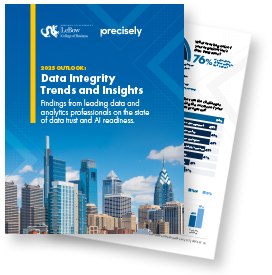Data professionals typically regard their area of expertise as fitting squarely within the domain of hard science. After all, it’s centered around knowable facts. Even subjective information, such as customer satisfaction metrics, is ultimately rooted in a fact-based understanding of quantifiable human reactions to a product or service. It should presumably be relatively easy to trust the insights derived from data analytics for data intelligence. However, that is rarely the case, falling far short of true data integrity that delivers accuracy, consistency, and context.
As part of a holistic data integrity approach, companies implement data governance programs to build trust in the data. Trustworthy data, in turn, has the powerful potential to reveal meaningful insights and drive better-quality business decisions. The 2023 Data Integrity Trends and Insights Report from Drexel University’s LeBow Center of Business Analytics found that data governance has a positive impact.
“Organizations with a data governance program are seeing improvements in the quality of data analytics and insights (57%) as well as the data itself (60%), and more than half have a comprehensive data strategy in place. 66% of the respondents found that the leading benefit of data governance is improved data quality. Yet 54% of those organizations do not measure data quality enterprise-wide.”
Proactive Data Integrity
In many organizations, there is a widespread expectation that high-quality, trustworthy data will be there whenever it is needed. It’s akin to a dial tone on your home phone or the electrical service at your workplace. Users don’t necessarily think about it most of the time; they tend to do so when they perceive a problem.
At the same time, many users seem predisposed to question the veracity of the available data. In some respects, this is a good thing. It encourages people throughout the organization to think deeply about what they are looking at, how the data was gathered and processed, and what it means. However, organizations must orient themselves toward data-driven decisions to win in today’s competitive business environment.
A healthy measure of skepticism can be a very good thing, ultimately contributing to a better outcome. Skeptical inquiry can help advance the trustworthiness of your data and the insights that the data provides to decision-makers in your company. But healthy skepticism should play out in the context of company-wide efforts to build and maintain trust in data-driven insights.
Increase Visibility into Data Governance
Communication breeds confidence. To build trust in the data, leaders in data integrity should be prepared to show their work to bring visibility around data meaning, ownership, lineage, and other data changes. They need to demonstrate how they are gathering and preparing data and what measures are being taken to improve data quality enterprise-wide.
Data governance and quality metrics can be beneficial in providing business users with a clear understanding of the effort undertaken to build trust in the data. When the right pieces are in place, and data management leaders communicate that proactively to others in the organization, it naturally engenders greater trust in data-driven insights.
So, what can business leaders do to proactively cultivate a culture of data integrity? Here are some practical steps to get you started:
#1: Foster a Sense of Data Ownership
Much has been written in recent years about “data democratization,” empowering business users to access the information they need quickly and easily without creating unnecessary dependencies on the IT department.
Data democratization also implies the need to foster a sense of data ownership. Users should understand how the data was collected, how it is integrated with other data sources, and what measures are being taken concerning data quality.
To take this concept to the next level, some leaders in data management are empowering users to take an active role in managing data quality. One executive at a financial services firm recently shared with us that his company has democratized its processes around managing data quality. In the past, users were encouraged to report any issues they found through a data quality portal. Today, those same users are trained to explore and diagnose problems and to solve them on the spot when possible rather than simply report them.
#2: Focus on the Business Value of Data
Ultimately, data-driven insights should add business value. It is essential to understand and acknowledge the “why” of data analytics and, by extension, the data governance and quality processes that support it. This “why” ultimately connects your data integrity initiatives to things that truly matter to people in your organization.
In today’s fast-paced global economy, business moves at the speed of the Internet. Consumers are accustomed to getting exactly what they need virtually at a moment’s notice. Business users, likewise, often have high expectations concerning the speed at which they can access information and the convenience and precision of getting what they want.
Data leaders should foster a culture where their teams fully understand what is important to business users and how data can positively impact the levers that generate business value.
2025 Outlook: Essential Data Integrity Insights
What’s trending in trusted data and AI readiness for 2025? The results are in!

#3: Evangelize the need for Data Integrity
A key element in successfully managing data initiatives is the ability to evangelize those business benefits. Senior executives should clearly understand the strategic and tactical value of data analytics and do their part to ensure organizational commitment. That includes aligning incentives so business users develop a sense of ownership in data integrity and the value of data-driven insights. Industry-leading data governance solutions link KPIs, goals, and business objectives directly to the critical data assets to measure and bring visibility to their impact.
Among middle managers and individual contributors, evangelization is just as important. Leaders should know their audience to communicate the value of analytics most effectively. In the context of a healthcare organization, for example, the chief medical officer will be primarily concerned with patient outcomes. In contrast, the CFO is more likely to see things first and foremost through a financial lens.
Precisely the global leader in data integrity, in partnership with the Center for Applied AI and Business Analytics at Drexel University’s LeBow College of Business, surveyed 565 data and analytics professionals on their organizations’ data strategies, priorities, challenges and the state of data trust and AI readiness. The results are in, read the report today! 2025 Outlook: Essential Data Integrity Insights







